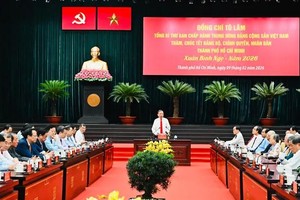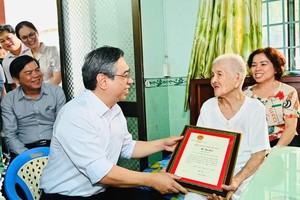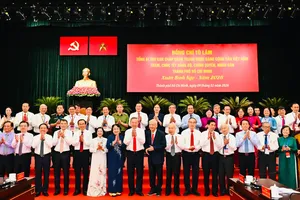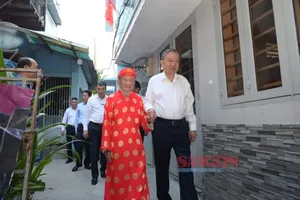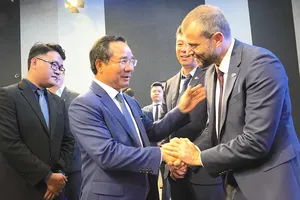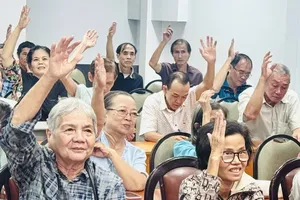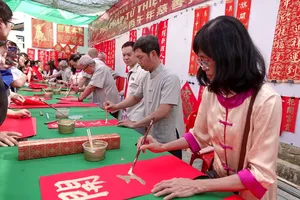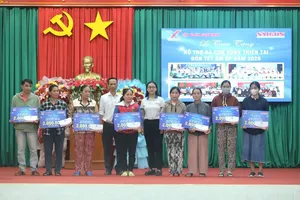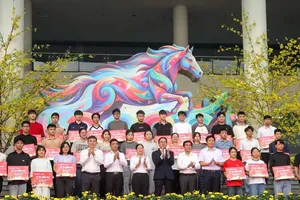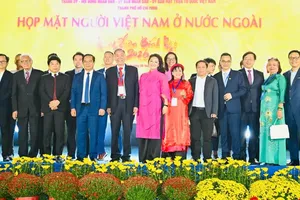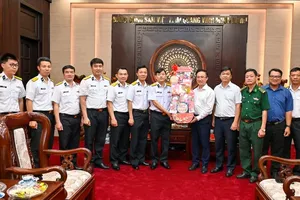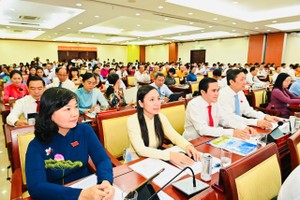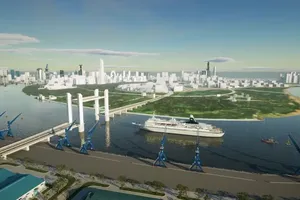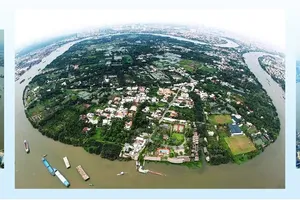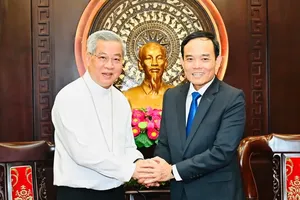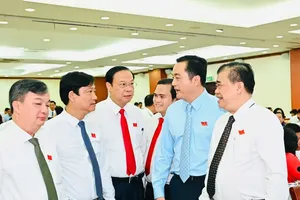 Mr. Nguyen Van Nen talks to foreign experts at the forum. (Photo: SGGP)
Mr. Nguyen Van Nen talks to foreign experts at the forum. (Photo: SGGP)
The People's Committee of HCMC held the HCMC Economic Forum on April 15. The forum attracted the participation of more than 900 delegates, enterprises, and financial institutions inside and outside the country.
Attending the forum were Mr. Nguyen Xuan Thang, Politburo Member, Director of the HCM National Academy of Politics, Chairman of the Central Theoretical Council; Mr. Le Minh Khai, Secretary of the Party Central Committee, Deputy Prime Minister; Mr. Nguyen Van Nen, Politburo Member, Secretary of the HCMC Party Committee; Mr. Phan Van Mai, Member of the Party Central Committee, Standing Deputy Secretary of the HCMC Party Committee, Chairman of the People's Committee of HCMC.
At the opening of the forum, Mr. Phan Van Mai, Chairman of the People's Committee of HCMC, raised four key points of the city that need the opinions of enterprises, financial institutions, and domestic and foreign speakers.
First, with a population of more than 10 million people, HCMC contributes about 22 percent of GDP and about 27 percent of the total national budget revenue. The city is the place where nearly 40 percent of enterprises operate under the Law on Enterprises and it has potential in science - technology and education – training with a wide range of national university systems, schools, and research institutes with an abundant force of experts. Therefore, HCMC has set a development goal that by 2025, the city will become a smart city, a service, industrial city toward modernity, maintaining the role of economic locomotive and driving force of the Southern Key Economic Zone and the whole country, taking the lead in innovation, and having a good, civilized, modern, and sentimental life quality.
Attending the forum were Mr. Nguyen Xuan Thang, Politburo Member, Director of the HCM National Academy of Politics, Chairman of the Central Theoretical Council; Mr. Le Minh Khai, Secretary of the Party Central Committee, Deputy Prime Minister; Mr. Nguyen Van Nen, Politburo Member, Secretary of the HCMC Party Committee; Mr. Phan Van Mai, Member of the Party Central Committee, Standing Deputy Secretary of the HCMC Party Committee, Chairman of the People's Committee of HCMC.
At the opening of the forum, Mr. Phan Van Mai, Chairman of the People's Committee of HCMC, raised four key points of the city that need the opinions of enterprises, financial institutions, and domestic and foreign speakers.
First, with a population of more than 10 million people, HCMC contributes about 22 percent of GDP and about 27 percent of the total national budget revenue. The city is the place where nearly 40 percent of enterprises operate under the Law on Enterprises and it has potential in science - technology and education – training with a wide range of national university systems, schools, and research institutes with an abundant force of experts. Therefore, HCMC has set a development goal that by 2025, the city will become a smart city, a service, industrial city toward modernity, maintaining the role of economic locomotive and driving force of the Southern Key Economic Zone and the whole country, taking the lead in innovation, and having a good, civilized, modern, and sentimental life quality.
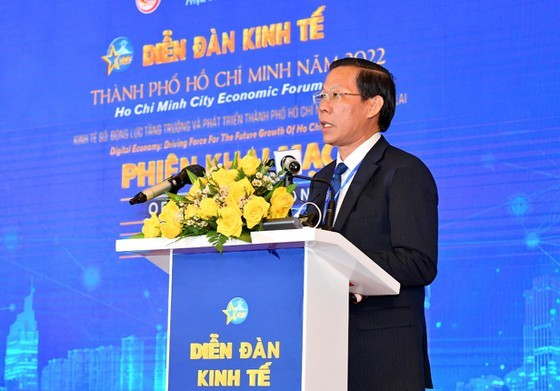 Mr. Phan Van Mai, Chairman of the People's Committee of HCMC, speaks at the forum. (Photo: SGGP)
Mr. Phan Van Mai, Chairman of the People's Committee of HCMC, speaks at the forum. (Photo: SGGP)
By 2030, HCMC will become a modern industrial and service city, a cultural city, a leading city in the digital economy, digital society, digital government, an economic, financial, commerce, science and technology, and cultural center of Southeast Asia region. Of which, the city strives for the digital economy to contribute about 25 percent by 2025, and 40 percent by 2030 to the GRDP. Secondly, it is necessary to develop and effectively implement a plan to improve administrative reform indicators, provincial public administration and governance efficiency indexes, and provincial competitiveness indexes with practical solutions, directly addressing the difficulties, obstacles, and shortcomings. Digital transformation will be prioritized in some areas where people and businesses have a high demand to focus on investment and make fundamental changes, such as land, construction, civil status, business registration, and investment registration. Thirdly, the city focuses on implementing specific programs and projects directly related to the goal of building a digital economy, including cooperation on digital transformation within the framework of joint cooperation between the People's Committee of HCMC and the World Bank in Vietnam; focuses on data management to serve the management and administration of the city's socio-economic development.
The city also focuses on solving the problem of connecting data at the city-wide scale and developing a shared database and open database so that people, businesses, and authorities can promote cooperation to build an ecosystem of high-value utility products, creating an environment that encourages creativity and entrepreneurship.
In addition, HCMC implements the tasks under the program "Research and development of artificial intelligence (AI) applications in HCMC in the 2020-2030 period" to make AI become a core technology in the construction of creative urban and smart city, promoting fast and sustainable digital economic development; synchronously develops digital infrastructure to serve the digital economy and digital society following the project on “Development of telecommunications infrastructure” and the plan on “Digital infrastructure development of HCMC in the 2020-2030 period; researches to implement trial policies with control for new digital services and new digital economy business models that are not clearly regulated by law.
The Southern largest city has a mechanism for enterprises to use the Science and Technology Development Fund to serve digital transformation and improve competitiveness in the market; focuses on deploying the Innovative Startup Center, forming a network of start-up support centers as a foundation for connecting and developing the city's innovation ecosystem; studies the project of building an International Financial Center in HCMC, with three main functions including money market, capital market, and derivatives market, operating on the advantage of digital technology.
Fourthly, the economic characteristics of HCMC, with more than 95 percent of small and medium-sized enterprises and more than 300,000 individual business households, create vitality for the economic life of the city. Although digital transformation will improve the efficiency, productivity, and competitiveness of enterprises and business households in all economic sectors, it also faces many challenges, of which the outstanding factor is human resources, including human resources meeting the requirements of digital transformation and redundant human resources for not meeting the requirements of digital transformation in each enterprise, which means motivation and obstacle are interwoven.
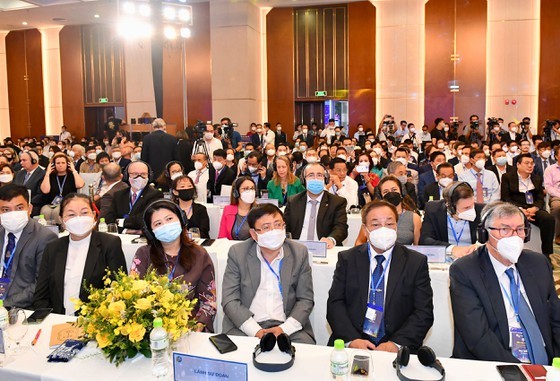 The forum attracts the participation of more than 900 delegates, enterprises, and financial institutions inside and outside the country. (Photo: SGGP)
The forum attracts the participation of more than 900 delegates, enterprises, and financial institutions inside and outside the country. (Photo: SGGP)
Within the framework of the forum, Mr. Nguyen Van Nen, Secretary of the HCMC Party Committee, emphasized further that the HCMC Economic Forum was attended by delegates, businesses, and experts from Japan, South Korea, Russia, Singapore, Israel, and Thailand. Besides, major international financial institutions were also present there, such as World Bank (WB), International Finance Organization (IFC), World Economic Forum (WEF), experts, and scientists inside and outside the country. This will be an opportunity for HCMC to listen and develop solutions to effectively transform and develop the digital economy, which is extremely urgent for the city. In the first quarter of 2022, the city's economy regained its growth momentum with 1.88 percent, compared to a negative growth of minus 11.6 percent in the fourth quarter of 2021, and continued to contribute to one-third of the national State budget. According to Mr. Nguyen Van Nen, the Covid-19 pandemic has left serious and unpredictable consequences, but, on the other hand, it has been promoting digital transformation in all three contents - digital government, digital enterprises, and digital society. This is also an opportunity for HCMC to carry out the digital transformation program, build a digital economy, and restructure the economy based on development in the era of the Fourth Industrial Revolution.
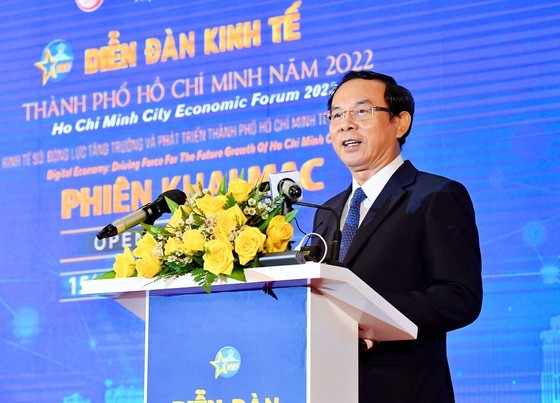 Secretary of the HCMC Party Committee Nguyen Van Nen speaks at the HCMC Economic Forum 2022. (Photo: SGGP)
Secretary of the HCMC Party Committee Nguyen Van Nen speaks at the HCMC Economic Forum 2022. (Photo: SGGP)
With dynamism and creativity, HCMC-based enterprises have been taking advantage of new business opportunities from digital transformation, participating, and actively contributing to the digital economy. This is also the new orientation of HCMC for fast, sustainable, inclusive, and adaptive development in the context of many fluctuations. However, the digital economy is still a brand new field. Besides infrastructure investment and the leadership of the local government, the city needs the contribution of scientists, experts, and policymakers from the central government, valuable lessons from enterprises, localities, and international organizations to ensure synchronism and efficiency.
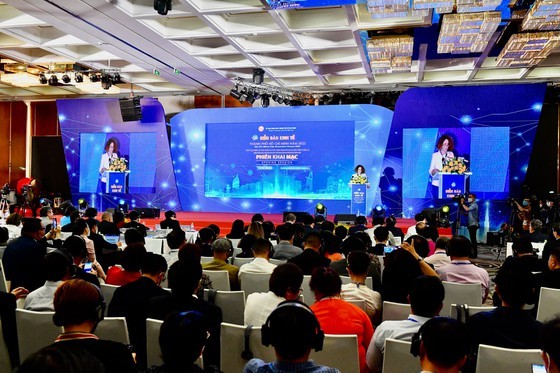 The scene of the HCMC Economic Forum 2022. (Photo: SGGP)
The scene of the HCMC Economic Forum 2022. (Photo: SGGP)
The digital economy also requires the go-getter spirit, innovation, and creativeness to look for business opportunities of entrepreneurs. Effectively implementing digital transformation and the digital economy is one of the important opportunities, helping HCMC, in particular, and Vietnam in general gain a head start by taking a shortcut to develop rapidly, catch up, and pass other countries in the region. With that spirit, the forum has an important meaning, contributing to opening a new development direction for HCMC. Through the forum, the city leaders believe that they will receive many valuable ideas and lessons to effectively carry out the digital transformation program of the city.
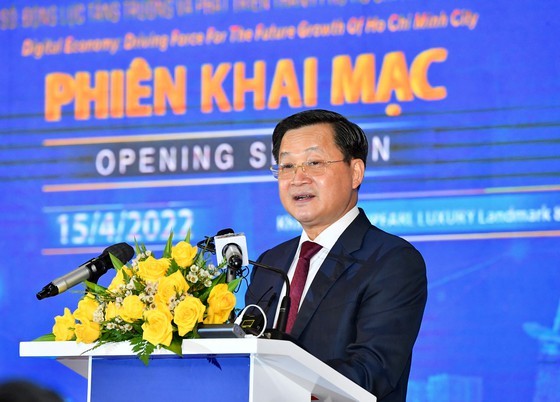 Deputy Prime Minister Le Minh Khai speaks at the HCMC Economic Forum 2022. (Photo: SGGP)
Deputy Prime Minister Le Minh Khai speaks at the HCMC Economic Forum 2022. (Photo: SGGP)
Deputy Prime Minister Le Minh Khai said that, in terms of digital economy development targets, HCMC had set higher goals than the whole country, in which, the digital economy would contribute 25 percent by 2025 and 40 percent by 2030. To accomplish these goals, the city leaders need to perform the following four tasks: Firstly, they should continue to improve the investment environment, attract, and exploit all resources well to develop production and business activities of goods and services, i.e., the real economy, because only when the economy is strong and goods and services are abundant will it be a sustainable foundation for the development of the digital economy, online business or other high-class services. The Government will continue to accompany HCMC in investing in synchronous infrastructure, reviewing institutional inadequacies, and improving the quality of human resources to solve bottlenecks in development. Secondly, the digital economy is a brand new matter for Vietnam but not new to many countries. The digital economy has formed common frameworks and approaches, with universality and borderless nature. Therefore, it is necessary to strengthen cooperation, exchange, and learn from other countries, partners, and international friends. However, the city needs to study seriously, methodically, and continuously to absorb the quintessence and valuable lessons of international friends. Moreover, the application needs to ensure the specificity of Vietnam and HCMC and should not be mechanical. Thirdly, the general orientation and national strategy on the digital economy and the digital society have been ready. The remaining problem is to quickly and effectively apply them to the actual activities of the city. The motto of implementing digital transformation and digital economy is "breakthrough thinking, strategic vision, practical, and concrete way of doing”, so as to not waste resources and be inefficient.
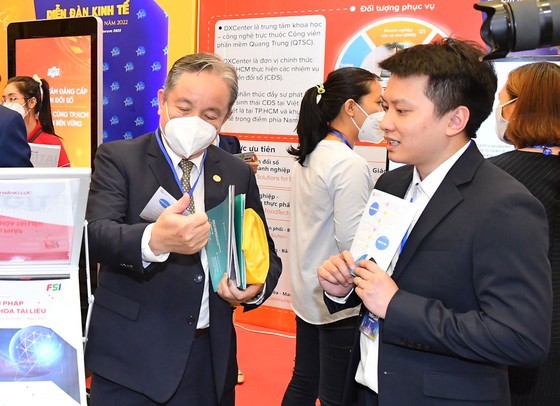 Guests visit the exhibition at the HCMC Economic Forum 2022. (Photo: SGGP)
Guests visit the exhibition at the HCMC Economic Forum 2022. (Photo: SGGP)
To do so, it is necessary to have a detailed and feasible plan with synchronous solutions, creating opportunities for relevant parties to participate in digital transformation and the digital economy. The government must be the one to lead, explore, create conditions for the development, and attract businesses and individuals to participate in a common ecosystem. For issues that have not been regulated or beyond regulations, the city should propose to pilot them and learn from experience at the same time, expand step by step, and should not be a perfectionist and should not rush. Lastly, in the meantime, while HCMC continues to invest in digital infrastructure and improve other essential infrastructures, it is important to raise awareness, knowledge, and skills of human resources participating in digital transformation and the digital economy. Only with the proper awareness, i.e., understanding and support, will enterprises spend time and money on this revolutionary change, then digital transformation will be successful. Of which, raising awareness needs to start with the civil servants.
